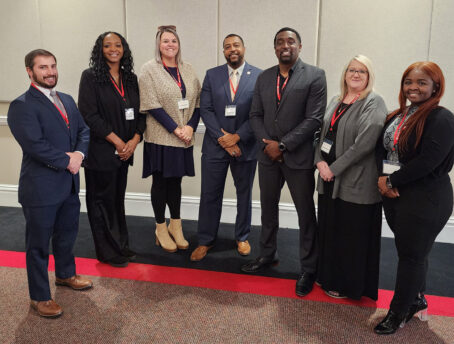The "I am a Rural Teacher!" project exists to highlight outstanding rural educators, and to share their voices. Our rural teacher profiles showcase the stories and philosophies of teachers around the country. We are excited to feature Dr. Nathan Hamblin, an educator, mentor, district leader, editor/consultant, and educational researcher teaching mathematics for the rural Twin Valley Community Local Schools in West Alexandria, Ohio. In addition to this interview, Dr. Hamblin also has a fantastic, thoughtful blog, is active on Twitter, and is a member of the "I am a Rural Teacher!" Facebook group. We hope you enjoy his interview!
When did you realize you wanted to be an educator? And when did you realize you wanted to teach in the rural context?
From a very young age, I loved school. I loved learning. I vividly remember in elementary school an assignment in which we traced our silhouette, decorating it to represent what we wanted to be when we grew up. I made myself a doctor. That’s not what I thought I would be – it just made sense to my young mind. Throughout the years, many wonderful teachers impacted my path. Unbeknownst to me, these educators were placing me on a trajectory that would ultimately shape my career choice.
College was not a topic of discussion in my home growing home. My parents and grandparent had moved from rural Appalachia in southeast Kentucky to southwest Ohio in look for work. Dad had graduated with an 8th grade education. Mom did not finish elementary school. Like the typical rural family, the focus in our home was on work. Education was not looked down on but the ultimate aim was to get a good job out of high school to support a family. With this mindset, my educational plans would take me to a vocational school to learn a trade. This would change by the end of my freshman year.
It was in high school that I began to have that tug. I knew there was more. It finally came junior year while sitting in Mr. Crain’s math class. That tug was a calling – a calling that made me realize, “I want to be a teacher!” All those teachers over all those years had molded me for that moment. With that new found calling, I pushed forward – becoming the in my family to go to college. The culmination of that educational journey was completed this past summer as I successfully defending my dissertation, earning a Ed. D. in Educational Leadership. (At right: Dr. Hamblin's "I am a Rural Teacher!" sticker, plus a student-drawn portrait in his classroom)
As beloved Kentucky author Jesse Stuart (1987) stated, “Teachers who don’t have the calling aren’t worth your good tax dollar – and I use the word ‘calling’ in the old-fashioned pulpit sense” (p. 304). Teaching is a calling - a calling of integrity, service, and humility. I came to realize it I that I did not choose teaching – I was called into it. I have now spent over two decades abiding in this calling - pursuing this passion – predominantly in the rural setting.
Why rural? Borrowing a line from Garth Brooks, “Blame it all on my roots.” Although I have taught and found success in schools that range from large suburban to small-town rural, I seem to have a connection to the people, places, and schools that typically are out in the ‘middle of nowhere.’ Every student I have taught – whether they be from the suburbs, small town, or farm – have been MY kids. My love for teaching and those I taught never waned due to the setting. However, rural school districts, and the communities they serve, all share unique characteristics that provide a distinctiveness – a richness -that my rural Appalachian roots just connects with.
What are some of your favorite things about teaching in a rural place?
As I noted in my blog, rural school districts, and the communities they serve, all share unique characteristics that provide a distinctiveness from their urban/suburban counterparts (Burton, Brown, & Johnson, 2013; Fishman, 2015; Sundeen & Sundeen, 2013; Tiecken, 2014; White & Corbett, 2014). Rural schools are typically the centerpiece of the community in which they serve, an institution connecting generations of families (Hassel & Dean, 2015; ; Lin, Isernhagen, Scherz, & Denner, 2014; Wilcox, Angelis, Baker, & Lawson, 2014; Witte & Sheridan, 2011). As Tieken (2014) noted in her recent work, Why Rural Schools Matter, “[the rural school] is more than a job or an institution; it’s an identity” (p. 65). It is due to these very things - this rural identity - that I hold a deep commitment to teaching within its framework. I will continue to make visible contributions to and be a voice for its advocacy because, yea, #RuralMatters!
Teaching in a rural setting has unique challenges and opportunities. What are some of the challenges you’ve encountered as a rural teacher?
Some of the very things that make rural so appealing also provides some of the hardest challenges. As one report indicates, “Engaging rurality is apparently not easy” (Howley, Howley, & Yahn, 2014). When an educator is considered an outsider, it takes time and dedication. The best means to engage the rurality will build upon a relationships, where the teacher demonstrates they are there for the rural folk and not one to change them. There is a rural identity. It is the responsibility of each rural educator to make that connection.
Beyond that, challenges have come from the economic discrepancies that come with the rural setting (i.e lower pay which equates to lower recruitment/retention of teachers, technology – or lack there of, etc).
What unique opportunities do you have as a rural teacher?
The unique opportunities come when the one taps into that rural identity. As I mentioned earlier, there is a distinctiveness – richness – to the rural setting. As an educator within the rural setting, when you make that connection, you are family. You will be called out at the local grocery, served dinner at the mom & pop diner, attend weddings and (sadly) funerals. There is no “escape” within the rural setting.
What would you tell future educators who may be looking to teach in a rural setting?
I would refer back to the words of Jesse Stuart – who was a rural educator himself. Teaching is a calling. To be a rural teacher is a special calling. As one famed teacher put it, “Make your calling and election sure.” The people and places throughout rural America are special. You do not come to the rural schools for fame or fortune. You come because you are called.
Is there a story from your rural teaching career that stands out to you? An “ah-ha!” moment or particularly influential time in your journey as a teacher?
As I sit here writing this, I immediately recall when a handful of my students came to my front porch – sending one to knock on my front door – asking me if I would mind sitting with them. They had questions from their homework they wanted help with. I didn’t hesitate.
My mind also goes to receiving a call from two former students – sisters – who were attending the University of Kentucky. They wanted to surprise my wife and I with tickets to Midnight Madness tickets because they knew I was a UK fan. A few years later, I would be asked to perform the wedding of one of the sisters and baptize the other.
Most recently, I was asked to attend the annual FFA awards banquet. It was during the ceremony that I learned I was inducted as an honorary member to our high school’s chapter.
These are just a few of so many. It was times like these that let me know that I had been accepted into this rural identity – I was family.
Any other thoughts on the idea of “the rural advantage?”
Just the phrase itself – there is nothing like “the rural advantage!”



